CUC eNews: June 23, 2020 – Issue 116
In This Issue:
- Letter From Vyda
- Unitarian Minister Sees Room for Hope in Spite of Racist Violence
- Pipelines, Democracy and Aboriginal Title
- Black Lives Matter Roundtable: A Canadian UU Perspective
- Ministry A Long-Time Calling for Rev. Debra Thorne
- Webinar Will Offer Insights on Fostering Healthy Congregations
- Sunday Summer Services Series
- Shining Lights Winner: First UU Church of Winnipeg
- Can You Help Rebuild the Unicamp Board?
- Help Bring a Rwandan UU Family to Canada
- CUC Office Taking a Break
- Upcoming Events
Letter From Vyda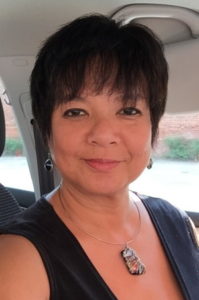
Why We’re Here
By Erik Walker Wikstrom
Here, today, in this place and with these people,
May we listen so that we can hear;
May we hear so that we can feel;
May we feel so that we can know; and
May we know so that we can change ourselves and this world.
May this chalice we light,
Light our Way.
The world feels very heavy these days. 2020 so far has brought hard challenges globally – volcano eruptions, a global pandemic with long-lasting and far-reaching repercussions, the deaths of George Floyd and Regis Korchinski-Paquet, protests, and now – the deaths of Chantel Moore and Rodney Levi in New Brunswick in the first weeks of June.
Our hearts grieve.
In a month when Canadians recognize National Indigenous People’s Day, we mourn, again, the deaths of Indigenous people who died in encounters with police in 2020. In recognition of this tremendous loss, we think it is important to say their names.
Rodney Levi, 49 years, Metepenagiag First Nation NB, June 12, 2020
Chantel Moore, 26 years, Edmundston NB, June 4, 2020
Stewart Kevin Andrews, 22 years, Winnipeg MB, April 18, 2020
Jason Collins, 36 years, Winnipeg MB, April 9, 2020.
Eishia Husdon, 16 years, Winnipeg MB, April 8, 2020.
The systemic oppressions and discrimination within our social and justice systems that have resulted in their deaths must be dismantled and replaced with alternatives that are rooted in equity and relationship, rather than in violence and force. Marie-Claude Landry, Chief Commissioner of the Canadian Human Rights Commission, said in a June 4 statement, “It is not enough to say that we embrace diversity and human rights as the foundation of our democracy. Racism violates human rights. Whether conscious or unconscious, subtle or overt, it diminishes human dignity and it erodes democracy.
It is time for change. In the words of Martin Luther King Jr: “there comes a time when silence is betrayal.” That time is now.
The CUC has issued a statement calling for substantive change.
Given the disturbing events that occur almost daily, it would be easy to become mired in a sense of hopelessness. And yet, there is still reason for hope. The New York Times Top 10 Bestsellers list for the second week in June were all books related to understanding racism, Black Lives Matter and the Black experience. Protests, calls for action, and most importantly, conversations continue to push us towards new ways of understanding.
Preceding National Indigenous Peoples Day, I saw recognition for the need for real change in the messages and conversations happening online. And Pride Month is being creatively and exuberantly celebrated with virtual galas, parades, and performances that connect us with one another across the country and around the world. The conversations our staff are having with congregations and leaders about planning for in-person gatherings in the times of COVID are thoughtful and heartwarmingly considerate of the needs and experience of all.
As a staff team, we have been preparing for our Black Lives Matter Roundtable on June 25, and we came across the above Chalice Lighting from Rev. Erik Walker Wikstrom which is posted above. It seemed to perfectly capture the moment of the world. People listening, intently, so that they can hear, feel and learn, and then let that knowledge change them.
I want to take a moment to acknowledge the really amazing work that all of us are doing together in very challenging times, to find new ways of learning and connecting, to make a difference. I invite you to continue this work by joining us at the Black Lives Matter Roundtable, by watching the Dr. Sinclair discussion (more info is at the bottom of this page) we hosted last month, and by reaching out to find ways to be welcoming, thoughtful and radically inclusive in your own community.
Unitarian Minister Sees Room for Hope in Spite of Racist Violence
For Rev. Fulgence Ndagijimana, an affiliated community minister with Saskatoon Unitarians, the killing of George Floyd was both shocking in its brutality and sadly familiar. It followed numerous previous incidents of racist violence and discrimination against Black Canadians and Indigenous Peoples, both in Canada and the United States, and it triggered feelings of anger and fear in him and others who have experienced such discrimination. But while Ndagijimana is mindful of the fear and frustration many may feel during these times, he also believes there is room for hope, provided real change happens in the wake of George Floyd’s death, with the global movements against racism.
For Ndagijimana, Floyd’s murder highlighted what he and other North Americans of African descent experience on a constant basis: being stopped by the police, being followed while shopping for fear they might steal, and many other instances of discrimination. While such incidents might be less visible than those such as Floyd’s death, Ndagijimana notes that they have happened repeatedly to himself and other people of African descent in Saskatoon and elsewhere. And they will continue to happen, he believes, unless the people with the power and privilege to stop such behaviour take action.
Ndagijimana believes many Canadian Unitarians are in positions to advocate for change and hopes they will take advantage of it to press ways to dismantle oppression. He welcomes the actions Canadian Unitarians have already taken against racism, such as the work of the Dismantling Racism Study Group, and he believes Floyd’s murder can serve as a catalyst for them to expand on these efforts.
Ndagijimana stresses that he recognizes racism will not end overnight. That’s why an important starting point, he believes, is a greater willingness to talk about it, even when doing so can be uncomfortable for white people. Twenty years from now, he hopes, people such as his 12-year-old son will experience a different reality than the one they face today.
“There is hope in the screaming, there is hope in the crying. There is hope in talking about it,” he says. “So this should not be seen as a time of desperation. It’s a time of reckoning. We see this is hard, we see this is difficult, but we also have an opportunity to galvanize all these efforts. This is actually a good time for all of us, for everyone to do something.”
- See Ndagijimana’s sermon, “I Will Tell Them I Choose Hope,” delivered to the Saskatoon Unitarians on June 14, 2020.
Pipelines, Democracy and Aboriginal Title
In May, the CUC hosted a conversation with Dr. Niigaan Sinclair entitled Pipelines, Democracy and Aboriginal Title with Dr. Niigann Sinclair. The conversation explored issues around Aboriginal land title, hereditary vs. colonial leadership, consent, consultation, and the various layers of justice that need to be considered when addressing issues such as climate action. As an author, educator, commentator and the son of Senator Murray Sinclair, Dr. Sinclair shared his unique perspective on Indigenous rights and reconciliation.
The recording of this conversation is now available online via the CUC’s Vimeo channel for a nominal fee by filling out this order form, which will be shared with Dr. Sinclair. We encourage you to watch this and discuss with your congregations, friends, and colleagues
Read More About CUC Initiatives Related to Indigenous Issues
Black Lives Matter Roundtable: A Canadian UU Perspective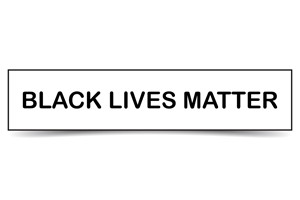
Thursday, June 25, 4 pm PT | 5 pm MT | 6 pm CT | 7 pm ET | 8 pm AT
Join a panel of Canadian UUs facilitated by CUC staff for an enlightening discussion about systemic racism in Canada. Together we will consider how we can respond individually and as a community of faith, and what we can do to actively oppose and dismantle racism in ourselves, our organization, and in our broader community.
Speaking on the panel are:
- Professor Emeritus Dr. Wilburn Hayden, who is currently researching the history of black Canadians and who has previously offered workshops on racism and white supremacy at UU gatherings.
- Rev. Fulgence Ndagijimana is an ordained Unitarian Minister, working with the Saskatoon congregation. He was forced to flee Burundi after being kidnapped and tortured for his work there.
- Dr. Mark Morrison-Reed served as co-minister of Unitarian Universalists congregations in Rochester, New York, and Toronto with his wife, the Rev. Donna Morrison-Reed, and is the author of a number of books about Black history and Unitarian Universalism. He will speak to the historical perspective and draw on the survey and resulting lecture he offered at the CUC AGM 2013
- Members of the Dismantling Racism Study Group
Following the panel we will break out into small groups for personal discussion and reflection.
Join Us for the Black Lives Matter Roundtable
Ministry A Long-Time Calling for Rev. Debra Thorne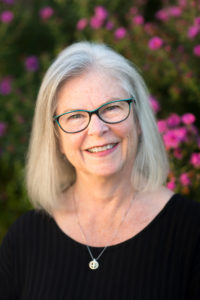
Rev. Debra Thorne has served as minister for the First Unitarian Fellowship of Nanaimo since August of 2019. Prior to that, she served at Beacon Unitarian Church in New Westminster, BC.
Debra’s path towards ministry began in her early 20s when she started attending Unitarian services in Regina as a university student. About a decade later, she became a lay chaplain with the Unitarian Church of Vancouver, an experience that made her realize ministry might be a fit for her. But as a single mother of two children, it seemed out of reach at the time. Another decade later, however, she had a chance encounter with a woman in similar circumstances who was studying to become a minister. Debra realized she could do it too, so she “pulled it off the shelf” and finished her studies. It’s a choice she’s glad she made.
“I love working with a community to build worship filled connection,” she says, “and especially small group ministry where we can walk together in those deep, deep places of heart and soul.”
Small group ministry is a particularly important part of Debra’s ministry at present, as her congregation grapples with the Covid-19 pandemic. Although she notes that it’s still in the early stages, she hopes to focus on the deeper meaning of this time, how it’s affected people, and how they can grow from it. She describes the present period as “liminal time,” a period between the end of one world and the beginning of the next, characterized by uncertainty but also a sense of possibility.
“We are forced into being uncomfortable and letting go of our control,” she says. “And when you let go of control, when you are uncomfortable, it’s like the ground is being tilled, and you just don’t know what’s in the ground that’s being tilled, you just have to do the tilling.”
Debra believes that the renewed sense of interdependence prompted by the pandemic makes Unitarian Universalism especially relevant for these times.
“We have a powerful, powerful message in that seventh principle (of respect for the interdependent web of all existence of which we are a part), and everybody’s living it now,” she says. “We are interdependent, we need each other and we affect and are affected by everything and everyone around us.”
Amidst the uncertainty of these times, Debra still enjoys simple pleasures, such as working in her garden and taking long walks in the neighbourhood. She also takes comfort in the quote from Julian of Norwich, the 14th-century mystic, that “all will be well, and all manner of things will be well.”
Webinar Will Offer Insights on Fostering Healthy Congregations
Conflict happens in every congregation, but it needn’t be destructive. When handled in a sensitive way grounded in Unitarian principles, it can actually present an opportunity to learn, grow, and ensure continued congregational health.
“Conflict isn’t bad, conflict is inevitable,” says Rev. Linda Thomson, the Canadian Unitarian Council’s Congregational Life Lead for the Central and Eastern regions. “There are differing priorities and needs and perspectives, and when we do conflict well, I think we’re actually modelling who we say we want to be.”
This recognition that handling conflict constructively can be valuable is what spurred Linda and Joan Carolyn, her counterpart for the Western and BC regions, to organize an online workshop on Fostering Healthy Congregations taking place on July 18.
Linda and Joan understand that congregations can sometimes be reluctant to address conflict head-on, for fear they could make the situation worse or in the hopes that the issue might simply go away if left unaddressed. But, in fact, Joan says the opposite is often true. A congregation that won’t confront disruptive behaviour can sometimes prompt members to leave because they don’t want to belong to an organization that won’t set clear boundaries.
Setting clear boundaries, Joan adds, can be done in a respectful way.
“This isn’t going to someone and saying ‘you’re doing something bad that nobody else ever does, ‘ she says, “this is going to them and saying, some of what you are doing is causing hurt and we need to look at it and address how things could happen differently.”
While Linda and Joan will present on strategies they’ve learned for dealing with conflict, the workshop will also allow participants to learn from each other. Through watching videos, small group discussions, and free reading, participants will leave with new insight and strategies to help effectively manage competing priorities and deal with conflict in the future, recognizing that it isn’t something to be afraid of.
“We sometimes jokingly say conflict is a gift,” says Linda, “because it means there’s potential to do something better and differently.”
Register For the Webinar By July 11, 2020.
Sunday Summer Services Series
Sundays from July 5 to August 30, 1 pm PT | 2 pm MT | 3 pm CT | 4 pm ET | 5 pm AT
Travel across the country this summer without ever leaving home. This summer, nine different congregations or groups are hosting special Sunday Summer Services and inviting all UUs to attend. This series builds on the phenomenal success of our Cross Country Service hosted by Halifax in May, with over 1,000 attendees. Each group or congregation will host services with a different theme and welcomes all UUs and friends. Consider joining them all to get the flavour of UU congregations across the country.
In place of a typical collection, attendees are encouraged to donate to their home congregation, the host congregation, a chosen charity, or to the CUC Special Collections. Information about donation options will be available during each service.
July 5 -Hosted by North Shore Unitarian Congregation, Theme: Religion and Disruption
July 12* – NOTE different time, 10:30 Mountain, hosted by Unitarian Church of Edmonton, Theme: Hope and Perseverance: Genocide Memorial
July 19 – Hosted by Youth, Theme: National Youth Service: Celebrating life in a time when life is limited
July 26 – Hosted by Unitarian Church of Montreal, Theme: Lessons from the Prayground: Reflections from Religious Exploration teachers
August 2 – Hosted by Young Adults, Theme: To Get to the Other Side”
August 9 – Hosted by U. Fellowship of Fredericton, Theme: Connections between the UFF and the one time Harvey Universalist Church
August 16 – Hosted by Saskatoon Unitarians, Theme: Reverence for Weird Things
August 23 – Hosted by Grand River Unitarian (Kitchener), Theme: Parable of the Plumber
August 30 – Hosted by Westwood Unitarian, Theme: Nature in the 6 Sources
Pre-registration on Zoom required – https://bit.ly/UUSummer. Once you have registered, you will receive an email from Zoom with the link, call-in information and meeting ID.
The CUC’s Zoom has a capacity of 1,000, so if you find yourself unable to enter the service, even if you’re pre-registered, head on over to the CUC’s YouTube channel.
Please note: Kids and youth under 18 must attend with a parent/guardian.
Join Us for the Sunday Summer Services Series
Shining Lights Winner: First UU Church of Winnipeg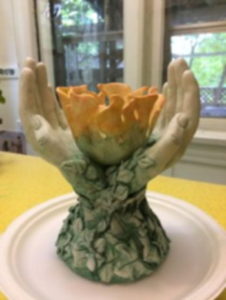
Congratulations to the First UU Church of Winnipeg, this year’s Shining Lights Award Winner! The Shining Lights Awards celebrates innovative and creative initiatives developed by UU congregations. The program highlights the excellent work of all the entrants, allowing them to share the ideas and the learning that has come from their program.
This year the winning entrant was one of two submitted by the First UU Church of Winnipeg (FUUCW).
With the goal of engaging the broader community, showcasing the local UU community, and facilitating meaningful dialogue, the FUUCW team developed a month-long celebration, including more than 20 events, centered around the topic of death, dying and grief.
In the Shining Lights presentation on May 9 during the CUC’s Annual General Meeting, organizer Liz Redston commented that based on response to a death café event in 2016, they knew there was community interest in this topic that was not being met in other ways. Rather than positioning themselves as experts, the team drew on resources in the community by facilitating conversation, and linking organizations and people to engage multiple segments of the community. By providing a wide variety of activities and opportunities, FUUCW gave people a way to explore Unitarian Universalism beyond a Sunday morning experience.
The team hosted a variety of events including a resource fair, movie and art night, book discussion, and two well-attended workshops: an advanced care directives workshop and a full day of communications workshops which was delivered twice with more than 45 people attending. Overall the organizers estimated more than 400 attended the events, with 75 to 80% of those being new connections for their congregation. They celebrated the success of the month-long event with a potluck meal and meaningful conversations with new friends and community partners.
Liz Redston said the team was grateful to win the Shining Lights award and for the opportunity to share the project, and even more importantly, to learn from other projects. “We’re all doing wonderful work and we are happy to share the award collectively with everyone here.”
Elizabeth’s advice for anyone wanting to undertake a large project is to be clear about your vision, pay attention to the details and build a strong team. To hear the FUUCW presentation, and watch the entire Shining Lights ceremony please visit (link)
Learn More About the Shining Lights Award
Can You Help Rebuild the Unicamp Board?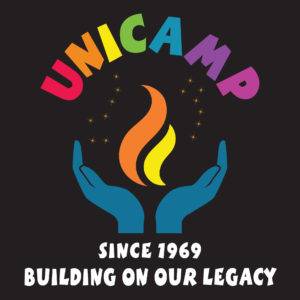
Unicamp, the much-loved Unitarian Universalist seasonal camp and spiritual retreat, finds itself in a precarious position. COVID-19 has meant that the camp, located 90 minutes north of Toronto, will remain closed until at least August 1 and children’s and youth camps have been cancelled for the 2020 season. Now, more than ever, Unicamp urgently requires strong leadership since it is in a precarious financial position because of the pandemic. With several members completing their terms, Unicamp’s nominating committee has been tasked with finding a new slate of candidates with the skills and dedication to help guide Unicamp into the future.
The term for new board members starts September 2020. Terms are two years, with the option to renew. The board meets online monthly for up to two hours via Zoom conferencing. The nominating committee is seeking applications from candidates with particular expertise in how nonprofits are managed, experience making and monitoring a budget, UU leadership experience, experience as camp staff, property management, human resources, law and marketing and business skills.
Board directors must be members in good standing of a church, congregation, or fellowship recognized by the Canadian Unitarian Council. The CUC has committed to providing development training to the new board.
To apply for a board position please email your C.V. and a note regarding your area of interest to Unicamp nominating committee member Barb Wentworth (barbw@ica.net) by July 1, 2020.
Find More Information on the Unicamp website
Help Bring a Rwandan UU Family to Canada
The Universalist Unitarian Church of Halifax is sponsoring a Rwandan family of four and needs your support.
In 2008, Jean Paul (not his real name) met Unitarian Universalists from the US and Burundi who introduced him to the Seven Principles. Jean Paul was so impacted by this meeting, he went on to establish his own NGO (non-government organization), based on UU principles, which works for a Rwanda where everyone can live in peace and love.
As a result of his work, Jean Paul has been kidnapped twice, and brutally tortured. During his second kidnapping his wife gave birth to their second son. Following his release his church was closed and his NGO was under extreme political pressure. He and his wife realized they would never be safe and must flee. Even in their temporary residence, they are not safe.
UUs have a chance to bring Jean Paul, his wife and their two boys to Canada but need your help to fundraise $36,000 to support the costs of relocation, housing and other necessities for Jean-Paul’s family’s first year in Canada. The UU Church of Halifax’s volunteer team will welcome this family and work closely with them during their settlement year providing logistical, social and emotional support.
Please, Give Generously to this GoFundMe campaign
CUC Office Taking a Break 
The CUC office will be closed from July 20 to August 3, and re-open on August 4. We hope that you too, will have opportunities to unplug, enjoy the outdoors safely, and find unique physically-distancing ways to connect with loved ones.
Here’s to summer 2020 – one we’ll never forget!
Events
As we head into the summer months please note that the COVID Leader’s Roundtable and our Coffeehouse Connections events will be on hiatus during July and August.
Until further notice, all CUC events will be held online via Zoom.
Share what’s going on in your congregation. Contact communications@cuc.ca
Featured Events
Black Lives Matter: A Canadian UU Perspective Roundtable
Thursday, June 25, 4 pm PT | 5 pm MT | 6 pm CT | 7 pm ET | 8 pm AT
Join a panel of Canadian UUs, facilitated by CUC staff, for an enlightening discussion about systemic racism in Canada. Together we will consider how we can respond individually and as a community of faith, and what we can do to actively oppose and dismantle racism in ourselves, our organization and in our broader community.
Fostering Healthy Congregations, Saturday, July 18, 9 am PT | 10 am MT | 11 am CT | 12 pm ET | 1 pm AT ( 6.5 hours with breaks), registration deadline: July 11
Healthy relationships are crucial to building a strong and inclusive congregation. How can we respond appropriately and sensitively to conflicting priorities and perspectives within our congregations? Leaders, board members, ministerial staff, and committee chairs are invited to explore aspects of congregational connection and conflict. Cost: Sliding scale – $10 – $40, Groups (3 or more) – $20 per person (one person must register the whole group at one time).
Upcoming Events
Processing the Pandemic: Young Adult Grief Ritual
Thursday, June 18, 5:00 pm PT | 6:00 pm MT | 7:00 pm CT | 8:00 pm ET | 9:00 pm AT (1.25 hours)
COVID Leaders Sessions
Saturday, June 20 – Supporting congregations over the summer
9 am PT | 10 am MT | 11 am CT | 12 pm ET | 1 pm AT
Unitarians A-Z
Tuesdays, June 23 and July 14, 4 pm PT | 5 pm MT | 6 pm CT | 7 pm ET | 8 pm AT
Sunday Summer Services Series
July 5 – Hosted by North Shore Unitarian Congregation, Theme: Religion and Disruption
July 12* – different time, 10:30 MT, hosted by Unitarian Church of Edmonton, Theme: Victims of Genocide
More information is available on the CUC Events Calendar.
Regular Online Events
Gathered Here: Young Adult Check-In
July 6 – 8 pm, July 23 – 2 pm, (all times ET)
Young Adult Informal HangOUUts, June 28 – 4 pm, July 6 – 9:15 pm, July 12 – 4 pm (All times ET)
Join a casual social drop-in space for young adults (18-35-year-olds), hosted by YAs Micaela Corcoran and Camille Bousekla!
Connect and Deepen – Virtual Gathering
Sunday, June 14, Saturday, July 11, 1 pm PT |2 pm MT| 3 pm CT| 4 pm ET| 5 pm ADT Please register in advance.
International Events
Unitarian Universalist Association General Assembly, June 24 – 28, 2020,
The UUA General Assembly is a 100% virtual event this year – a great opportunity to attend. Online registration is $150 USD. The CUC will be presenting a live online workshop on Truth, Healing and Reconciliation, with guest Sharon Jinkerson Brass, on Sunday, June 28.


